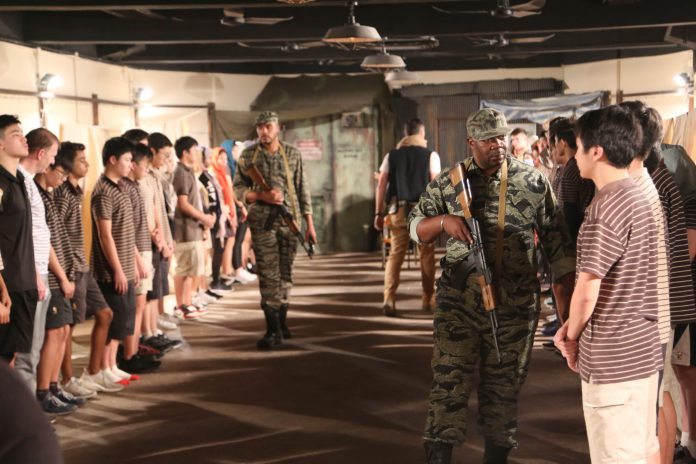
NGOs are committed to raising awareness about asylum seekers’ issues through simulations.
By Gabriella Lynn
Young single mother Kristel*, an asylum seeker from the Philippines, can only live in Hong Kong with help from others. She survives on HK$1,200 food coupons, HK$200 in cash for transportation, and HK$1,800 for housing every month.
As for necessities like toiletries, clothes, and masks, Kristel cannot afford them. “I use one mask for three days, and the mask is really thin and itchy. My baby doesn’t have masks,” she says.
Kristel came to Hong Kong to work as a domestic helper in 2017. She has been forced to become an asylum seeker since her employment contract was terminated in 2019.
While trying to search for another job, Kristel became pregnant with her baby Ali. Concerned about her family’s reaction, she overstayed her visa while trying to find ways to stay in Hong Kong longer.
“Back home, I was the breadwinner, and I was single. I didn’t know how to explain to my mother why I got pregnant while working,” Kristel says.
Kristel did not immediately surrender to immigration authorities as she was afraid of being deported. During her pregnancy, she finally decided to surrender so she could get access to medical care in the city.
“(Before surrendering to the immigration authorities), I couldn’t get check-ups. I couldn’t even go to hospitals. I hadn’t had an ultrasound – nothing. I needed a private doctor but I didn’t have enough money. So, I surrendered and they gave me temporary papers until I gave birth,” she says.
After giving birth, Kristel began the process of applying for asylum. From her friends who have overstayed in Hong Kong, she learned about Refugee Union, a refugee-led society that protects the rights and well-beings of asylum seekers. She sought help from the group and has become a beneficiary of the organisation.
“Sometimes, (volunteers) take pictures of my baby and post them on Facebook when I need something, like baby formula or diapers. The next day, I get lots of donations from kind people,” Kristel says.

Because of COVID-19, searching for resources has been difficult. Kristel cannot go to other non-profit organisations in fear of infection risk. She often has to compete for donations with the other 800 active beneficiaries of Refugee Union because everything is distributed on a first-come-first-serve basis.
Understanding, Caring, and Changing
Refugee Union has been raising awareness about the situation of refugees through their social media pages. They post regularly about the needs of their members and run donation drives with other NGOs.
Crossroads Foundation, a non-profit humanitarian aid organisation, shares the same goal as well. The foundation’s Global X-Perience programme runs simulations that replicate the lives of underprivileged people. David Begbie, the director of the programme, wants more people to know about refugees like Kristel.

“The very first thing we have to do is make people care. But you can’t engage someone if they don’t know about the issue,” Begbie says.
A student who participated in the simulations, Felicia Lam Sum-tim, says her mindset shifted after attending a session in 2017. “I understood and became more empathetic towards the underprivileged because you just feel their frustration and (helplessness),” she says.
Lam found the experience so eye-opening that she has shared her experience with many others.
“I told a lot of people about (the simulation) and the situation of the underprivileged. (The simulations) can raise awareness as the experience made us reflect,” she says.
One simulation called “Refugee Run” is designed and run by real refugees. “We want to know that for people who have lived through the refugee life, the message of our simulation is on point. When we debrief after the simulation, we also ask them for their opinions,” Begbie says.
“People often come to me at the end of the simulations and ask me how I can use their lives to make a difference. And I tell them, just be themselves. Use their existing skills,” he adds.
“I’ve seen people’s perspectives change radically (after the simulations). Just for a moment, they got a taste of what (life as a refugee) is like, and they grieved at their own callousness,” Begbie says.
“I’ve seen people’s perspectives change radically (after the simulations).”
Making a Difference During COVID-19
Ever since the pandemic started, large gatherings have been prohibited. The simulations, usually consisting of 20 – 100 participants, have not been available for bookings for more than a year.

Despite the support, Begbie says that monetary donation is much needed. “ For a lot of people, they need money to survive. We need to get people back on their feet,” he adds.
Kristel shares Begbie’s opinions. “If we have job opportunities, then maybe we can have a normal life in Hong Kong. We don’t have to be beggars waiting for food and other donations. But because we have no money, there is no choice,” she says.
The Hong Kong government holds a “firm policy of not granting asylum and not determining or recognising refugee status of any person,” according to a government press release issued on May 20, 2020.
Illegal immigrants can make non-refoulement claims, and those with substantiated claims will not be deported.
But the press release also states that whether their claims are substantiated or not, claimants “have no right to work in Hong Kong.”
Out of the 31,429 claims made between late 2009 and December 2020, only 243 were substantiated, according to the Hong Kong Immigration Department.
*Full name omitted at the interviewee’s request
Edited by Patricia Ricafort
Sub-edited by Kassandra Lai






































